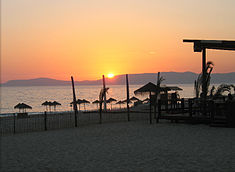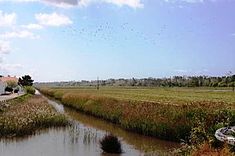- Comporta
-
Comporta Civil Parish (Freguesia) The white sand beaches of Carresqueira, along the Sado estuary in ComportaOfficial name: Freguesia de Comporta Name origin: comporta Portugeuse word for well-mannered Country  Portugal
PortugalRegion Alentejo Subregion Alentejo Litoral District Setúbal Municipality Alcácer do Sal Localities Brejo da Carregueira, Carrasqueira, Brejo da Carregueira de Cima, Cambado, Comporta, Figueiral Moitinha, Murta, Possanco, Torre, Torroal River Sado River Center Comporta - elevation 24 m (79 ft) - coordinates 38°22′45″N 8°44′5″W / 38.37917°N 8.73472°W Lowest point Sado River - location Tróia Peninsula, Comporta, Alcácer - elevation 0 m (0 ft) Length 22.38 km (14 mi), Northwest-Southeast Width 9.97 km (6 mi), Southwest-Northeast Area 150.54 km2 (58 sq mi) Population 1,348 (2001) Density 8.95 / km2 (23 / sq mi) LAU Freguesia/Junta Freguesia President Junta Maria Jóse Coelho Martins (CDU) President Assembleia Maria Custodio F. Pereira (CDU) Timezone WET (UTC0) - summer (DST) WEST (UTC+1) ISO 3166-2 code PT- Postal Zone 7580-628 Comporta Area Code & Prefix (+351) 265 XXX XXX Demonym Comportenses Patron Saint São Pedro Parish Address Rua 24 Junho, 13
7580-628 ComportaWikimedia Commons: Comporta Statistics from INE (2001); geographic detail from Instituto Geográfico Português (2010) Comporta is a civil parish and village in the municipality of Alcácer, in the old district of Setúbal, in continental Portugal, located at the base of Tróia Peninsula, along the Sado estuary. Information from the 2001 Census, identified a population of 1348 almost equally divided by gender (715 men, 633 women).
Contents
History
The history of this area stems from early settlement by black slaves, its toponymy assumed to be a condescending term to refer to their well mannered natures.[1][2] During the time of the Companhia das Lezírias, Comporta was a small agglomeration of 65 impoverished cabanas around a principal estate.[2]
Until 1989, Comporta was a part of the parish of Santa Maria do Castelo.
Geography
Located along the peninsula of Tróia on the southern margin of the Sado River, the region is characterized by the number or rice fields under cultivation. In addition, its vicinity within the Sado estuary makes the region a focus of many species of terrestrial and marine birds, including the grey herons, storks and flamingos.
While Comporta is the administrative centre of the parish, there are several small population concentrations throughout (localities, places or villages); they include: Brejo da Carregueira, Brejo da Carregueira de Cima, Cambado, Comporta, Figueiral Moitinha, Murta, Possanco, Torre, Torroal and Carrasqueira.
Economy
The principal economic activities in the area include fishing, agriculture, small industry associated with rice harvesting for local and migrant workers, in addition to many teritary services (hotels, bakeries, civil construction, sawmilling, carpentry and small commercial shops). Tourism has become an increasingly important part of this mix, with new investments into the area: the main village of Comporta has developed into an upmarket holiday destination, due to its tourist-friendly beaches and the number of restaurants and boutiques.[3]
Commercial rice cultivation was an important part of the economy since 1925, providing employment to many factories, although over the years these facilities have been closed and the management of the lands transferred to Lisbon or Ribatejo.[4] The "Comporta" brand, promoted by the Herdade da Comporta since 1925, gave way to new packaging under the Alcacer do Sal or Coruche brands.[4] The rice industry has become less an integral part of the community, and only the Arroz Ceifeira brand, managed by João Duarte Correia (an ex-miller in the Torrinha factory) continues to sell/promote the local industry.[4]
Culture
Portuguese handicrafts, particularly miniatures boats of wood, quilts, needlework and embroidery are common in many of the villages.
Although the patron saint is Saint Peter, the residents of Comporta continue to celebrate other religious festivals associated with the popular saints, in addition to the Festival do Arroz (English: Rice Festival), which celebrates the founding of the parish. Every two years the village of Carrasqueira is the site of the Festival da Batata Doce (English: Sweet Potato Festival), as well as being the annual meeting-place for motorcyclists. On the second Friday of each month, there is a traditional market, in which the inhabitants sell handicrafts, food and other goods.
The major associations in the parish are the Clube Recreativo da Herdade da Comporta (English: Recreational Club of the Herdade da Comporta), the Grupo Desportivo da Carrasqueira (English: Sport Group of Carrasqueira), the Grupo Motard Rateres do Sado (English: Motorcycle Club of the Sado) and the Associação de Moradores dos Brejos (English: Residents Association of Brejos) .
In addition to the popular bolinhos de arroz (English: rice balls), the traditional culinary plate in Comporta is beans with rice and linguiça, in addition to the popular bacon and chouriço and coriander cooked in a earthen pot over woodfire, or the arroz de bacalhau (English: cod in rice)[4], ensopado de enguias (English: eel soup/stew) and massa de peixe (English: fish pasta).[1]
Architecture
Civic
- Fonte da Abóbada
Religious
- Church of São Pedro (English: Church of Saint Peter)
- Chapel of São Pedro (English: Chapel of Saint Peter)
Carresqueira is also known for the wooden dock, a municipal heritage due to its method of construction, extension and important contribution to the local landscape, along with the Concheiros do Paleolítico.[1]
References
- Notes
- ^ a b c Nara Leão (29 October 2008). "Comporta" (in Portuguese). Comporta, Portugal: Mais Comporta. http://maiscomporta.blogspot.com/2008/10/comporta.html. Retrieved 16 March 2011.
- ^ a b Serpa Pimental et al. (1850), p.46-47
- ^ Egan, Maura (23 July 2010), "Full Disclosure: Comporta, Portugal", New York Times Style Magazine (New York, New York: The New York Times Co.), http://tmagazine.blogs.nytimes.com/2010/07/23/full-disclosure-comporta-portugal/, retrieved 16 March 2010
- ^ a b c d Nara Leão (1 December 2008). "Comporta "PortàPorta" [Comporta Door-to-Door]" (in Portuguese). Comporta, Portugal: Mais Comporta. http://maiscomporta.blogspot.com/2008/12/comporta-portporta.html. Retrieved 16 March 2011.
- Sources
- Serpa Pimental, António de; Andrade Corvo, João de; Figueiredo, António Joaquim de, eds (10 February 1850). "Impressões de uma viagem no Alentejo: 28 de Septembro" (in Portuguese). O Atheneu. Lisbon, Portugal. pp. 46–47. http://books.google.ca/books?id=KakiAQAAIAAJ&pg=PA46&dq=comporta+sado+hist%C3%B3ria&hl=en&ei=pLeATfLAA4OxhQfWp_ifBw&sa=X&oi=book_result&ct=result&resnum=3&sqi=2&ved=0CDYQ6AEwAg#v=onepage&q=Comporta&f=false.
Categories:
Wikimedia Foundation. 2010.



